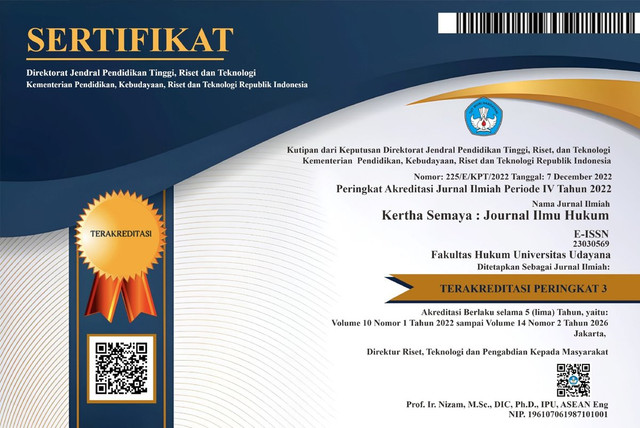IMPLIKASI DUALITAS KEDUDUKAN BUMN TERHADAP KEMANDIRIAN KORPORASI DAN FUNGSI PELAYANAN PUBLIK
DOI:
https://doi.org/10.24843/KS.2025.v13.i10.p05Keywords:
BUMN, Dualitas Kedudukan, Korporasi, Fungsi Pelayanan PublikAbstract
Penelitian ini bertujuan untuk mengkaji Badan Usaha Milik Negara (BUMN) khususnya pada dualitas kedudukan BUMN sebagai korporasi yang berorientasi pada keuntungan sekaligus sebagai instrumen negara dalam penyelenggaraan pelayanan publik serta implikasinya terhadap kemandirian korporasi dan fungsi pelayanan publik. Undang-Undang Nomor 1 Tahun 2025 tentang BUMN menghadirkan pembaharuan dan menawarkan Solusi dengan memperluas ruang kemandirian korporasi, namun disaat yang bersamaan justru juga meningkatkan beban kewajiban Public Service Obligation (PSO). Kondisi ini menimbulkan tumpang tindih antara hukum korporasi dan hukum administrasi negara yang berdampak menimbulkan ambivalensi, dimana secara normatif BUMN lebih mandiri, namun secara praktis tetap terikat dilema kewajiban ganda. Metode penelitian dilakukan menggunakan metode yuridis normatif dengan pendekatan interdisipliner hukum korporasi dan hukum administrasi negara. Hasil analisis menunjukkan bahwa harmonisasi dualitas kedudukan BUMN memerlukan mekanisme normatif berupa kompensasi PSO yang adil, penerapan prinsip good corporate governance, perlindungan manajerial melalui business judgment rule, serta pengawasan atas potensi monopoli.
This study aims to examine State-Owned Enterprises (SOEs) with a particular focus on the duality of their legal status—as profit-oriented corporations and simultaneously as state instruments in the provision of public services—and its implications for corporate independence and public service functions. Law No. 1 of 2025 concerning SOEs introduces legal reform and offers solutions by expanding the scope of corporate autonomy; however, at the same time, it also increases the burden of Public Service Obligation (PSO). This situation creates an overlap between corporate law and administrative law, resulting in ambivalence wherein SOEs are normatively more autonomous yet remain practically bound by dual obligations. The research employs a normative juridical method with an interdisciplinary approach combining corporate law and administrative law. The findings indicate that harmonizing the dual status of SOEs requires normative mechanisms such as fair PSO compensation, the implementation of good corporate governance principles, managerial protection through the business judgment rule, and effective oversight to prevent potential monopolistic practices.
Downloads
Published
How to Cite
Issue
Section
License
Copyright (c) 2025 Syafana Hanifah de vries, Ratih Damayanti

This work is licensed under a Creative Commons Attribution-NonCommercial-ShareAlike 4.0 International License.



